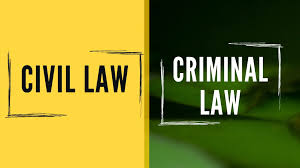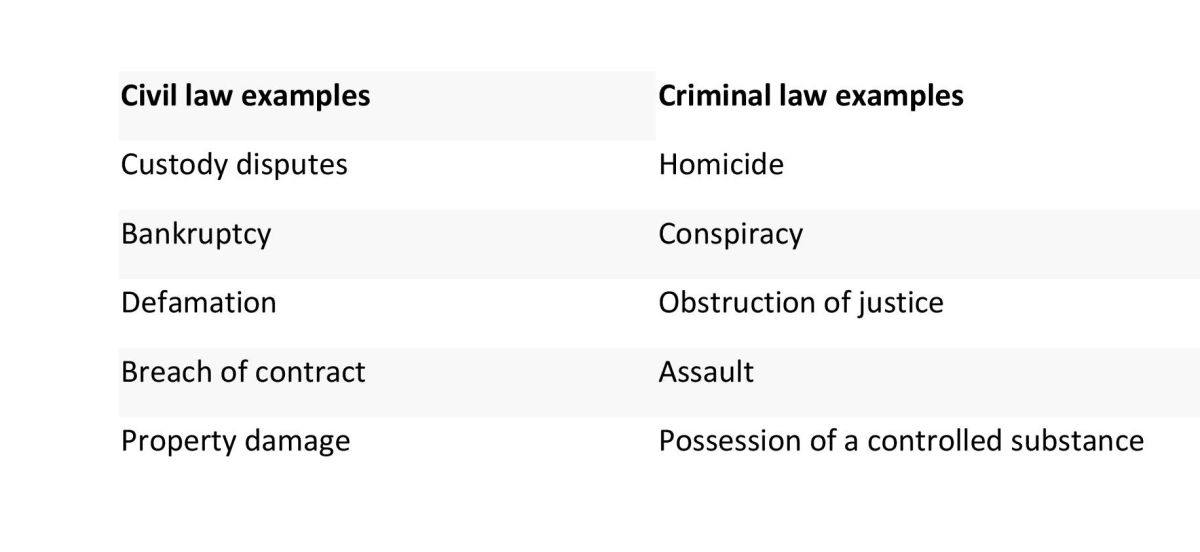
From John Grisham’s best-selling novels, to the vast number of shows on tv today and the more recent trend of true crime shows and podcasts, there is a fascination with how the media portrays the American legal system. Audiences are drawn to the drama, suspense and justice of the courtroom.
How much do you really know about how the law actually works? Are you aware of the differences between civil law and criminal law?
Let’s break it down:
Civil law vs. criminal law: The basics
Here’s what Merriam-Webster’s dictionary has to say:
“Criminal law” definition: The law of crimes and their punishments.
“Civil law” definition: The law of civil or private rights.
While these statements are accurate, they’re not quite the expansive definitions you’re looking for, so let’s dig into some of the basic differences between civil and criminal law.
While both deal with resolving a wrong committed by one party to another, there are several primary differences between criminal law and civil law, including:
· The conduct at issue
· Punishments
· Burden of proof
· Statutes of limitations
· Who initiates a case
· Appeals process
While this list is not exhaustive, it does cover many of the key differences between civil and criminal law.
With all of that said—what is civil law? To put it simply, civil law deals with resolving disputes between one entity and another. The guidelines for these disputes are outlined in official documents like a state’s business and professions code, the health and safety code, and other governmental rules and regulations. The cause of action in these cases can be initiated by private as well as public parties.
Criminal law, on the other hand, deals with an individual’s offenses against the state or federal government. It may sound literal—like someone physically assaulting a government official—but an offense against the state essentially means breaking a criminal law established by government.
Civil and criminal law examples
While the following examples are by no means comprehensive, they should give you a better idea of the subjects and types of cases you may find in either branch of law.

Civil law vs. criminal law: Punishment
Another important distinction between civil and criminal law is the type of penalty paid for being found guilty. In a criminal case, if the individual charged with a crime loses the case, they’re likely facing incarceration or some type of probation. For civil cases, the resolution to a case doesn’t result in the “losing” party going to jail. Often, the judgment results in a financial penalty and/or an order to change behavior.
Civil suits are also often settled outside of the courtroom. This typically includes a substantial payment to the accuser in exchange for the suit being dropped and the defendant admitting to limited or no wrongdoing.
 Civil law vs. criminal law: Who files a case?
Civil law vs. criminal law: Who files a case?
Another distinction between civil law and criminal law lies in who can initiate a case. Civil law cases can be initiated by any party.
For criminal law, only the government can initiate a case. This is typically the responsibility of local, state and federal prosecutors who work in coordination with law enforcement agencies. The decision to charge an individual with a crime isn’t always cut-and-dry, either. Prosecutors must weigh the evidence and circumstances surrounding a case and use their discretion to determine which charges are most appropriate and most likely to lead to a conviction.
Can civil law and criminal law apply in the same case?
In some instances, both a civil suit and a criminal case can stem from the same incident. Likely the most prominent example of this scenario is the O.J. Simpson case—his criminal charges were dismissed, but the family of the victim was able to successfully sue him in civil court.
This may seem like an uneven application of justice but remember the standards for burden of proof. A civil case doesn’t need to be as airtight as a criminal case to win a decision. So in this scenario, the jury in the criminal case thought there was at least some doubt about Simpson’s guilt, but in the civil case, a jury felt it met the standard of a preponderance of evidence.
We are here to answer any question you may have. Should you or a loved one find in need of legal help please contact us today to set up a free consultation. Please contact us by text or phone at (414) 774-6000 or email at laura@jlfwisconsin.com anytime.
*Any articles in the Libra or posted by Jones Law Firm LLC are not legal advice for a particular client or situation. Further no attorney-client relationship is intended or created with this post.*
- Tags:
- lawyer
- legal
- wisconsin law

